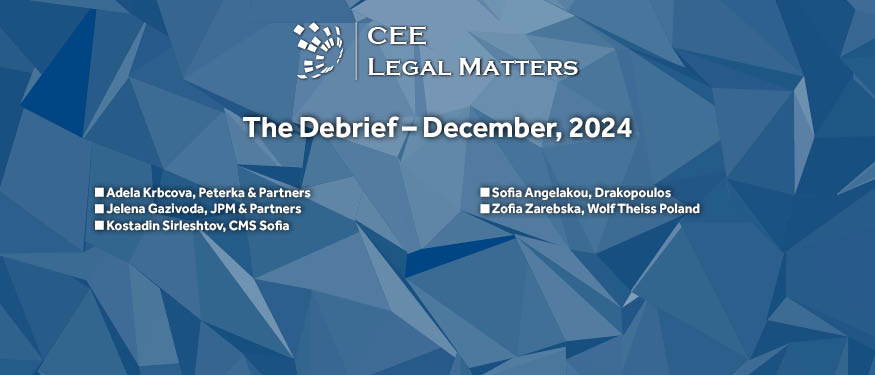In The Debrief, our Practice Leaders across CEE share updates on recent and upcoming legislation, consider the impact of recent court decisions, showcase landmark projects, and keep our readers apprised of the latest developments impacting their respective practice areas.
This House – Implemented Legislation
In Greece, companies are adjusting to changes in tax law. “The new VAT Code entered into force on October 11, 2024, by virtue of Law 5144/2024,” Drakopoulos Senior Associate Sophia Angelakou explains. “The new VAT Code serves as a codification of the old regime, which has been in force since 2000 and has been subject to numerous amendments, aiming to update and harmonize the regulatory framework and to ensure legal certainty for the taxpayers – persons subject to VAT, the public administration and the professionals in the sector, including lawyers and accountants. However, a further amendment to the VAT Code is expected in order for Greece to keep up with the latest developments in the EU in the context of the VAT in the Digital Age reform.”
This House – Reached an Accord
November 2024 in Serbia was marked by significant advancements in energy policy, and legislation framework, “all aimed to enhance energy security and stability, optimize the energy mix, and infrastructure modernization and development,” JPM & Partners Senior Partner Jelena Gazivoda says. “Key developments included the adoption of the Law on Amendments and Supplements to the Energy Law, the Energy Development Strategy of Serbia until 2040 (with projections to 2050), and several by-laws. These included regulations on market premiums, feed-in tariffs, quotas for wind and solar power projects, and the maximum prices for auctions in the market premium system. These measures culminated in the initiation of Serbia’s second auction procedure for market premiums, signaling a pivotal step toward the country’s renewable energy goals.”
According to Gazivoda, “amendments to the Energy Law contribute to regulating the balancing market and balance responsibility, creating conditions for the opening of the auxiliary services market, as well as for the merger of the national organized electricity market (electricity exchange) with the markets of neighboring countries, opportunities for end customers to conclude supply contracts with dynamic tariffs, the abolition of net metering for buyers-producers (prosumers) starting from December 31, 2026, the introduction of the ‘active buyer’ category, and the creation of the necessary preconditions for concluding a power purchase agreement, supply of green energy from power plants that will significantly contribute to the reduction of electricity supply costs, but will also have significant benefits resulting, inter alia, in the avoidance of paying CO2 taxes.” Gazivoda adds that “on the date of entry into force of the amendments to the Energy Law, the Law on the Prohibition of Nuclear Power Plants in the Federal Republic of Yugoslavia ceases to be valid, thus opening up space for the inclusion of nuclear energy in the energy mix, and the implementation of nuclear power plant construction projects.”
This House – Under Review
In the Czech Republic, discussions are ongoing regarding changes to the Labor Code that may take effect in early 2025. “The Chamber of Deputies is due to discuss the government’s draft amendment to the Labor Code aimed at introducing a number of flexible means to stimulate the labor market in the Czech Republic still this year,” Peterka & Partners Partner Adela Krbcova notes. “As the legislative session is suspended until December 3, it is uncertain if the amendment will be adopted this year.” One such possible change, according to Krbcova, “is for employers to be able to extend the trial period for regular employees from three months to four months, and to eight months for managers. This extension could be agreed upon when signing the employment contract. Or the parties may agree on a shorter trial period and then extend it within the maximum range, which is currently forbidden.”
The draft amendment does not consider unilateral termination without reason, “a change that initiated huge discussions among politicians, trade unions leaders, and professionals since its announcement,” she says. “But the draft amendment at least has the potential to speed up the termination procedure. The notice period will start from the date of delivery of the notice to the employee and not on the first day of the month following the delivery. Further, the standard notice period of two months shall be reduced to one month for termination reasons related to non-fulfillment of conditions of requirements for performing work, including unsatisfactory work reasons, or for violating duties resulting from labor regulations or the regime of a sick employee.” In addition, Krbcova reports that, “as of the 1 January 2025, there will be changes brought by other amendments, such as the potential self-scheduling of working hours by employees, or further changes to agreements outside of employment.”
This House – The Latest Draft
In Poland, efforts are underway to address workplace harassment. “The Ministry of Labor and Social Policy has recently announced plans to revise the definition of workplace bullying.” Although the details of the draft law are not yet available, according to Wolf Theiss Poland Associate Zofia Zarebska, “the ministry has promised that the new wording will be clearer and more precise. This action comes in response to the ongoing discussion about the prevalence of workplace harassment, which continues to be a significant issue.” Under the current legislation, Zarebska says that “workplace bullying is defined as any act or behavior relating to an employee or targeted against an employee that involves persistent and long-term harassment or intimidation, resulting in diminished self-esteem regarding their professional abilities. The purpose or effect of such behavior is to humiliate, ridicule, isolate, or exclude the employee from the team. Consequently, in order to claim compensation for the damage suffered, the employee must prove the cumulative fulfillment of numerous conditions.”
The amendment is motivated by concerning statistics. “In 2022, only 551 workplace bullying compensation cases were submitted to district courts, with just 17 cases granted compensation that same year,” Zarebska says. “This doesn’t necessarily mean that these disputes are resolved in a non-litigious manner. According to the Polish Labor Inspection, only one in five employees who experience workplace harassment seek support from the employer,” Zarebska reports pointing to a 2024 survey revealing “that over 41% of Polish employees reported experiencing harassment-like behavior in the workplace in the past six months.”
In the Works
“At the beginning of November, the Ministry of Energy published the evaluation of the received investment proposals under the procedure Support for new capacities for electricity production from renewable sources and electricity storage (Calls 1 and 2), financed within the framework of the National Recovery and Resilience Plan, has been successfully completed,” CMS Sofia Managing Partner Kostadin Sirleshtov reports. “A total of 327 proposals were received under Call 1, of which 267 were admitted to the ranking. The available financial resources under the procedure allow the financing of 200 projects with a total value of nearly BGN 107 million.” The projects envisage “the installation of 435 megawatts of production capacities from renewable sources and 176 megawatts of local electricity storage facilities. A total of 70 proposals were received under Call 2, of which 65 were admitted to the ranking of the proposals,” he adds. “The available financial resources under the procedure allow the financing of 49 projects with a total value of almost BGN 419 million. During their implementation, 2,660 megawatts of renewable energy generation capacity and 1,000 megawatts of local electricity storage facilities will be installed. 16 projects, for which there are insufficient financial resources, have been included in the list of reserve proposals with a total value of nearly BGN 43 million. The deadline for the implementation of the projects is March 31, 2026.”
Gazivoda says Serbia initiated its second auction for market premiums for wind and solar projects in November. “Participants must bid for at least 70% of each power plant’s capacity and submit a bank guarantee or cash deposit of EUR 30 per kilowatt for their proposed projects. Winners will secure 15-year CfD contracts and must provide an additional guarantee or deposit of EUR 60 per kilowatt for their awarded quotas. The deadline for bids is February 5, 2025.” Through these actions, she says that “the Republic of Serbia continues its commitment to the Green Agenda, optimizing its energy mix and aligning with sustainable energy goals.”
This article was originally published in Issue 11.11 of the CEE Legal Matters Magazine. If you would like to receive a hard copy of the magazine, you can subscribe here.
















